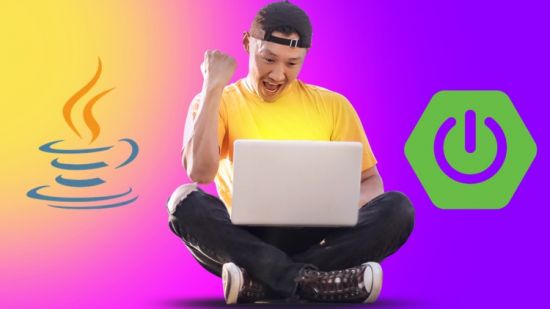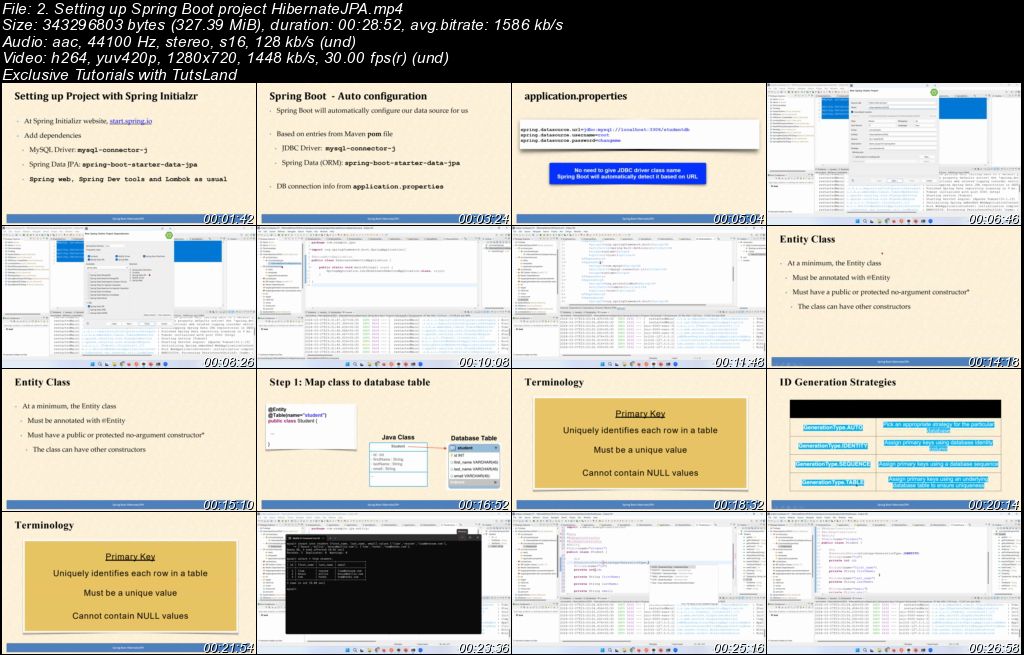
Published 5/2024
MP4 | Video: h264, 1280×720 | Audio: AAC, 44.1 KHz, 2 Ch
Language: English | Duration: 20h 31m | Size: 12.3 GB
Spring Boot, Rest API, Hibernate/JPA, Lombok, Spring Security, Spring MVC, Thymeleaf and Microservices (Use 1.25x speed)
What you’ll learn
Understanding Spring Boot Fundamentals: Gain a solid understanding of the core concepts and features of the Spring Boot framework.
Building RESTful APIs: Learn how to design and implement RESTful APIs using SpringBoot and Spring MVC. Understand best practices for handling HTTP requests, r
Developing MVC Web Applications: Learn how to build MVC (Model-View-Controller) web applications using Spring Boot and Spring MVC.
Implementing Microservices Architectures: Gain an understanding of microservices architecture and its benefits and challenges
Requirements
Java Programming Language: Proficiency in Java programming is essential, including knowledge of object-oriented programming concepts, data structures, and basic syntax. Spring Framework Basics: (optional) Familiarity with the core concepts of the Spring Framework is beneficial, including dependency injection, inversion of control (IoC), and aspect-oriented programming (AOP)
Web Development Fundamentals: Understanding of web development fundamentals, including HTTP protocol, HTML, CSS, and JavaScript. Database Fundamentals: Basic understanding of relational database concepts, SQL queries, and database design.
Description
The course is designed for Java beginners keen to learn Spring Boot from Basics.
It is designed and taught in such a way that beginners can easily grasp and code their own Spring Boot applications with minimal effort.
Spring Boot is a powerful framework for building Java-based applications, providing developers with a streamlined and opinionated approach to application development. Combined with Spring’s extensive ecosystem, it offers a comprehensive solution for building a wide range of applications, including RESTful APIs, MVC web applications, and microservices architectures.
REST API Development with Spring Boot: Spring Boot simplifies the creation of RESTful APIs by providing built-in support for various features such as
Annotation-driven programming model: Developers can use annotations like @RestController, @RequestMapping, and @GetMapping to define REST endpoints and handle HTTP requests.
Automatic JSON serialization/deserialization: Spring Boot automatically converts Java objects to JSON and vice versa using libraries like Jackson.
Embedded server: Spring Boot includes an embedded servlet container (e.g., Tomcat, Jetty) so that you can run your REST API as a standalone application.
Actuator endpoints: Spring Boot Actuator provides built-in endpoints for monitoring and managing your application, making it easy to monitor health, metrics, and other runtime information of your REST API.
MVC Web Application Development with Spring Boot: Spring Boot simplifies the development of MVC (Model-View-Controller) web applications by providing features such as
Spring MVC framework: Spring Boot integrates with Spring MVC to provide a robust web framework for building web applications.
Convention over configuration: Spring Boot adopts sensible defaults and auto-configuration, reducing the need for manual configuration.
Thymeleaf, FreeMarker, or other template engines: Spring Boot supports various view technologies for rendering HTML templates in MVC web applications.
Static content handling: Spring Boot can serve static content (e.g., HTML, CSS, JavaScript) from the classpath or external locations.
Embedded web server: Similar to REST API development, Spring Boot includes an embedded servlet container for running MVC web applications as standalone applications.
Microservices Architecture with Spring Boot: Spring Boot is well-suited for building microservices-based architectures due to its lightweight nature and extensive support for distributed systems. Some key features for building microservices with Spring Boot include
Spring Cloud: Spring Boot integrates with Spring Cloud to provide features like service discovery (e.g., Netflix Eureka), client-side load balancing (e.g., Ribbon), distributed configuration (e.g., Spring Cloud Config), and circuit breakers (e.g., Netflix Hystrix).
Externalized configuration: Spring Boot enables configuration to be externalized, making it easy to configure microservices independently of each other.
Containerization and orchestration: Spring Boot applications can be easily containerized using technologies like Docker and orchestrated with platforms like Kubernetes or Docker Swarm.
Resilience and fault tolerance: Spring Boot integrates with libraries like Netflix Hystrix to implement resilient microservices that can handle failures gracefully.
Overall, Spring Boot provides a comprehensive platform for building RESTful APIs, MVC web applications, and microservices architectures, offering developers a productive and efficient way to develop modern Java-based applications.
This course is a one-stop solution for all the Spring Boot technologies.
Who this course is for
All the Java aspirants who would like to see their career as the following: Java Developer: Design, develop, and maintain Java-based applications for industries. Backend Developer: Build robust backend systems using Java, JDBC, Spring Boot, and Restful services. Full-stack Developer: Combine Java expertise with frontend technologies for end-to-end application development. Software Engineer: Utilize Java skills in software engineering roles, ensuring quality and efficiency in software development.

Password/解压密码www.tbtos.com
转载请注明:0daytown » Spring Boot with Rest API, MVC and Microservices